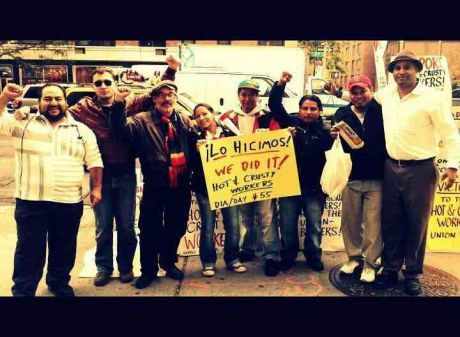Features
You are here
Workers Doing It For Themselves: Food service workers in New York and Chicago unite to improve working conditions

January 2, 2013
One of the most exciting developments currently unfolding among the working class in North America is the organizing efforts of non-unionized workers. Non-union workers make up about 70 per cent of the labour force in Canada and about 88 per cent in the US. This represents untold volumes of untapped power.
The recent actions of Walmart workers, while significant and exciting, are only one of several groups of non-union workers organizing to improve their own working conditions.
Historic win for Hot and Crusty Workers Association
In September 2012, New York City restaurant workers walked off the job and won a historic victory – a collective bargaining agreement that is a first for low-wage food-service workers, many of whom are undocumented people.
Twenty-three workers at one Hot and Crusty café (part of a chain) were organizing for more than a year, with support from Occupy Wall Street and the Laundry Workers Center, a workers’ support group. The Hot and Crusty workers were earning below minimum wage, were forced to work overtime (sometimes as much as 70 hours per week) without a higher hourly pay, and endured verbal and sexual harassment on a regular basis. They formed an independent union, the Hot and Crusty Workers Association, and demanded salary increases and improved conditions.
In retaliation, their employer closed the restaurant. Workers occupied the store, holding a workers’ assembly until forced to leave by the police. Undaunted, the workers opened their own café on the sidewalk outside the closed restaurant, serving coffee, bagels, and donuts in exchange for voluntary donations.
After only four days, the company asked to negotiate – but the workers rejected the company’s initial offers. Like restaurant workers throughout the US, most Hot and Crusty workers are undocumented, meaning they cannot work legally in the US. Employers routinely use the workers’ immigration status as an excuse for dangerous and unhealthy working conditions and illegally low pay, believing undocumented workers will be afraid to speak up. In this case, the company’s initial offers would have applied only to people with official work permits. In a strong show of solidarity and commitment, the Hot and Crusty Association workers rejected attempts to divide them.
Over the course of a 55-day picket, the workers received a tremendous outpouring of support, including thousands of petition signatures from the community (a high-income area), daily visits from students and faculty from nearby Hunter College, and letters of support from dozens of unions and labor organizations. Eventually, the owner sold the restaurant and the new ownership negotiated in good faith. The Hot and Crusty Workers Association now has a three-year collective agreement, truly a ground-breaking moment for food-service employees in North America.
The agreement includes wage increases, paid vacation and sick time, seniority, grievance and arbitration procedures, and union recognition, and is the first of its kind for food-service workers in North America. The agreement is the direct result of the workers’ own intelligence, determination, and courage – and their unity.
“We can’t survive on 7.25!”
Also in New York City, 200 fast-food employees walked off their jobs in November 2012, demanding a $15/hour minimum pay – a figure slightly more in line with the towering cost of living in that city. With the slogan “We can’t survive on $7.25,” workers from dozens of fast-food outlets, including McDonald's, Burger King, and Wendy's, organized under the banner of Fast Food Forward. It was the largest strike ever in the US against the fast food industry, which reaps some $200 billion a year in profits. Fast Food Forward emphasizes that better pay for workers benefits the entire community, calling for “better pay for a stronger New York.”
Along with pay increases, Fast Food Forward seeks health benefits and reliable scheduling. Fast-food workers cannot attend school or organize adequate child care, because their scheduling is often so erratic. The restaurants also force workers to work “off the clock” – with no pay at all – by scheduling tasks either before workers punch in or after they punch out.
Fight for fifteen
In Chicago, retail and food-service workers formed Workers Organizing Committee of Chicago. Like their sisters and brothers in New York, the Chicago workers received support from community groups but did the organizing themselves. WOCC’s “Fight For Fifteen” campaign calls for a $15/hour minimum wage. The workers have organized pickets and marches through the Michigan Avenue shopping area, and in an upscale, Michigan Avenue vertical mall, unfurled a banner reading “$1.5 billion” – that’s the combined salaries of the CEOs of their employer companies last year. WOCC represents workers of more than 100 different employers, from widely different backgrounds, all united in their struggle to improve their own lives.
Section:
- Log in to post comments










